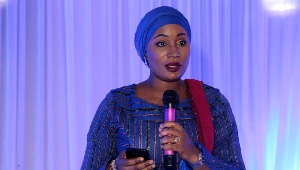Ghana’s Second Lady, Mrs. Samira Bawumia, has charged the World Health Organization (WHO) to prioritise discussions on clean cooking solutions and its impact on women’s wellbeing, at the first WHO Global Conference on Air Pollution and Health.
Addressing participants at a pre-conference workshop in Geneva, Mrs. Bawumia recounted the effects of ‘dirty’ cooking fuels on women and children, particularly those in Africa. She cited the unnecessary burdening of the girl child with time-intensive household energy tasks, whose energies and time could, otherwise, be deployed more usefully.
“Women and girls are disproportionately burdened by time-intensive household energies like cooking and fuel collection, working long hours to access the household energy needed to cook for their families.
“They often endure incredible hardships to do so – walking long distances, searching for fuel, and carrying heavy loads, risking spinal injuries, animal attacks, and sexual violence – or even spend their hard-earned income on dirty fuels. In addition, children-particularly girls, are at risk of compromising their education due to time spent on cooking related activities i.e. collection and down time due to health challenges”, she stressed.
She further bemoaned the harrowed effect of these fuels on the environment. “Household air pollution is the single most important environmental health risk worldwide”, she quoted data from the WHO.
According to Mrs. Bawumia, “There is the need for strong political will to drive the urgency to provide cleaner, healthier and safer forms of cooking fuels and cookstoves. It is important to consider how the resulting health complications put a strain our health facilities and impacts our economies. Universal access to clean cooking energy will not be feasible without public sector leadership”.
As an ambassador for the Global Alliance for Clean Cookstoves, and a proponent of gender equity, the Second Lady called for a multi-dimensional approach in tackling the menace, holistically. She called on governments, development agencies and the private sector, to come together to ensure the protection of women and children, globally, against this development.
The conference is scheduled to begin on October 30, 2018, in Geneva, Switzerland.
Health News of Tuesday, 30 October 2018
Source: starrfmonline.com

















